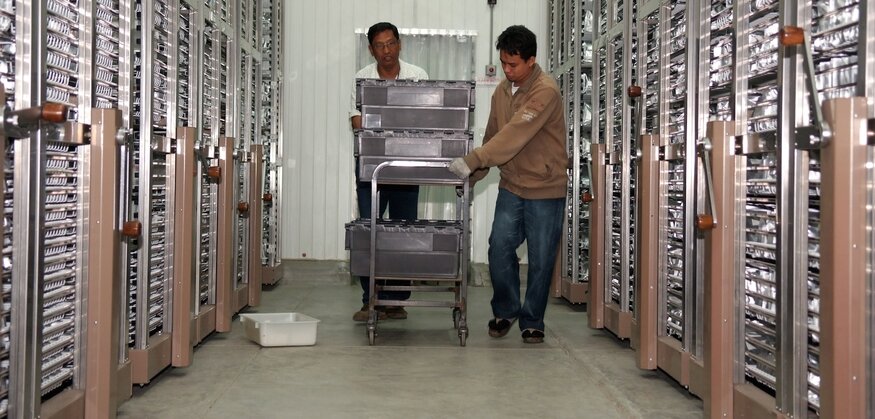Why Korea, and the World, Must Protect Crop Diversity

19 October 2014
Dr. Michael Koch penned an editorial on the importance of conserving crop diversity and issuing a call for action in the Korea Herald.
With Pyeongchang currently hosting the 12th meeting of the Conference of the Parties to the Convention on Biological Diversity, Michael Koch, director of finance at the Global Crop Diversity Trust, explains why we need to act now to ensure future generations will be able to feed themselves.
Speaking at the opening of the regular session of the 12th meeting of the Conference of the Parties to the Convention on Biological Diversity, which is taking place at the Alpensia Convention Center in Pyeongchang, Environment Minister Yoon Seong-kyu pledged that South Korea would “take the initiative in upgrading the value and preservation of biodiversity.” This pledge is immensely important, not just for South Korea, but for the world. Yet, it has received little attention, even here in the host nation.
Why is that? Why is the preservation of biodiversity not much higher on national agendas? Whilst the global challenges posed by climate change are issues that most people are familiar with, biodiversity and its importance for our future is much less understood.
Worldwide, we rely on a relatively small number of crops to feed the human race ― only about 150 crops, and a relatively small number of varieties of each of these crops, are cultivated on a large scale. The risks of relying on such a narrow base are enormous, and could have a disastrous impact on world food supplies.
However, there are approximately 7,000 crop species in existence, and 80,000 edible plant species, each of which exists in a vast range of varieties. For instance, South Korea has 26,906 varieties of rice in its national genebank. These varieties have developed as a result of variations in regional growing conditions and the intervention of farmers over millennia to meet specific conditions or needs. So from a pragmatic perspective, biodiversity’s significance is obvious. Its preservation will ensure we can continue to feed our children, and our children’s children, in an increasingly crowded and inhospitable world.
It is this diversity that enables the same crop to be grown in very different habitats, and for different markets, and crucially provides us with the raw materials to breed new varieties to adapt to changing conditions. If we lose that diversity, we lose the tools that we need to develop that crop ― potentially posing a threat to its continued existence. Do we really want to do without rice?
Worryingly, diversity is already declining. In order to stem the tide we need to put in place a rational and cost-effective system for its conservation, underpinning the world’s future food supplies.
The Global Crop Diversity Trust is the only worldwide response to this issue. Founded by the Food and Agriculture Organization of the United Nations and Biodiversity International on behalf of CGIAR (formerly the Consultative Group on International Agricultural Research) 10 years ago, the Crop Trust is an international organization working to guarantee the conservation of crop diversity, forever. It does so in support of the International Treaty on Plant Genetic Resources for Food and Agriculture of 2001, which 132 countries have signed, including the Republic of Korea.
Working in partnership with agricultural research centers around the world, we are spearheading the conservation of crop diversity in genebanks. To give an indication of the breadth of this diversity, the collection of rice supported by the Global Crop Diversity Trust at the International Rice Research Institute’s genebank in the Philippines conserves a staggering 131,862 varieties. Remember, South Korea has about 29,000. A lot, but not as many as it has access to through the International Rice Research Institute.
There is an economic aspect to this argument too. The agriculture and food sector in the Republic of Korea accounts for 2-3 percent of gross national income, and employs around 4 percent of the country’s working population. The future of this sector, including the jobs and businesses it supports, is equally reliant on crop diversity.
Whilst global in scope, the task at hand is neither technologically complicated, nor, considering its importance, expensive. The varieties of many of the most important crops can simply be stored at low temperature as seed in genebanks. However, funding even for this fairly straightforward process can be surprisingly difficult to come by, and many genebanks around the world have faced cutbacks that have meant the loss of unique seed varieties.
In response to this, the Crop Trust is raising an endowment, the interest from which will guarantee the effective conservation of all the varieties of key food security crops. Equally importantly, our work will ensure that these varieties can be used to develop new strains to feed future generations.
The Crop Trust has already raised over $180 million from governments, foundations, companies and individuals around the world. In order to preserve crop diversity forever, we are working to increase that sum to $500 million by the time of our international pledging conference in January 2016. It is in this way, by contributing to this vital fund to protect the world’s agriculture forever, that the government in South Korea, and indeed those around the world, can take one vital step in making good on Minister Yoon Seong-kyu’s pledge to take the initiative in preserving biodiversity.
Categories: Rice, Climate Change, Food Security
